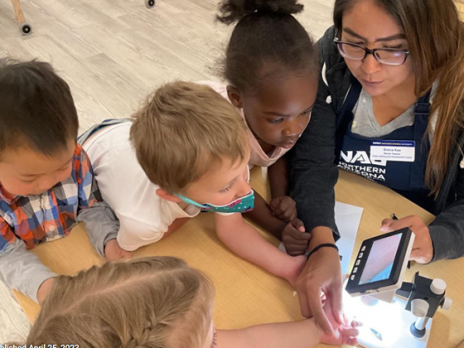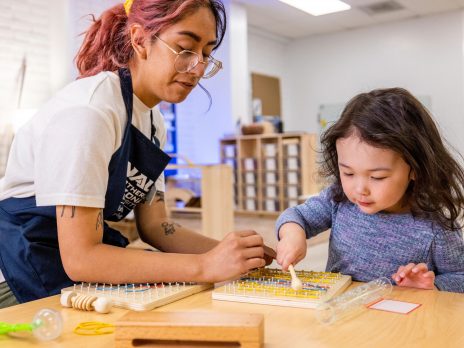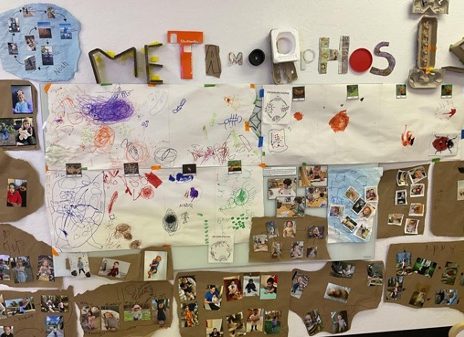Contact the Early Learning and Development Center
What is Inquiry-Based Learning?

The ELDC uses an inquiry-based approach for our learning. Based off of The Project Approach, Inquiry-Based Learning is a process of building learning experiences from children’s interests. These are developed in the form of Projects, or an in-depth investigation of a topic. The Project is broken into three phases:
-
Phase 1: Selecting a topic Tab Open
-
Phase 2: Research and investigation Tab Closed
-
Phase 3: Sharing knowledge event Tab Closed
Phase 1: Selecting a topic Accordion Open
Staff and children come together on a general topic to be investigated based on what children are interested in and what teachers observe in the classroom. The teacher summarizes, represents, or records what the children know or think about the topic, reflects on their past experiences with the topic, and generates questions they want to answer.
After identifying a topic, children share what they know about art in Phase 1 of the art project.

Phase 2: Research and investigation Accordion Closed
Staff and children will collect information on what they need to answer the questions they came up with in Phase 1. Morning meetings and investigation times will include visitors who have expertise on the topic, books and media on the topic, real life artifacts and materials with the topic, and documentation of the children’s understandings. The activities planned are linked to early learning standards. Children demonstrate their knowledge through art, model making, music, play, and conversations.
Children explored different art mediums in Phase 2, including the use of sand and paint.

Phase 3: Sharing knowledge event Accordion Closed
Children and staff examine the information they have collected and reflect on what they have learned from the project. They share a culminating event with the families and the community about what they have learned. The culminating event is a planned activity or presentation of their work that the children help plan.
In Phase 3, a culminating event closes out the learning process. Children created art for an art gallery display at the School of Art + Design.

-
Phase 1: Selecting a topic Tab Open
-
Phase 2: Research and investigation Tab Closed
-
Phase 3: Sharing knowledge event Tab Closed
Phase 1: Selecting a topic Accordion Open
Staff and children come together on a general topic to be investigated based on what children are interested in and what teachers observe in the classroom. The teacher summarizes, represents, or records what the children know or think about the topic, reflects on their past experiences with the topic, and generates questions they want to answer.
After identifying a topic, children share what they know about art in Phase 1 of the art project.

Phase 2: Research and investigation Accordion Closed
Staff and children will collect information on what they need to answer the questions they came up with in Phase 1. Morning meetings and investigation times will include visitors who have expertise on the topic, books and media on the topic, real life artifacts and materials with the topic, and documentation of the children’s understandings. The activities planned are linked to early learning standards. Children demonstrate their knowledge through art, model making, music, play, and conversations.
Children explored different art mediums in Phase 2, including the use of sand and paint.
Phase 3: Sharing knowledge event Accordion Closed
Children and staff examine the information they have collected and reflect on what they have learned from the project. They share a culminating event with the families and the community about what they have learned. The culminating event is a planned activity or presentation of their work that the children help plan.
In Phase 3, a culminating event closes out the learning process. Children created art for an art gallery display at the School of Art + Design.
Why Inquiry-Based Learning?
We know from research that children learn best through hands-on, play-based experiences that are connected to their own interests and real-life experiences. This means NOT coming to children with our agenda of what they must learn. It means building in learning through children’s interests. For example, sitting down a child to memorize letters from flash cards isn’t best practice, but pointing out the letters in the word sand, and tracing those letters in the sand while finding those letters in the sand book is a better practice.
Examples and resources about the Project Approach
Illinois Early Learning Project-Project Approach
The Project Approach in Inclusive Classrooms-NAEYC
Investigations Curriculum-Easter Connecticut State University
Sylvia Chard on the Project Approach
Our projects
The Bug Project
The Sand Project
The Art Project